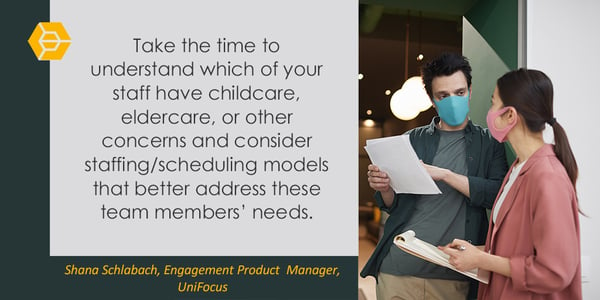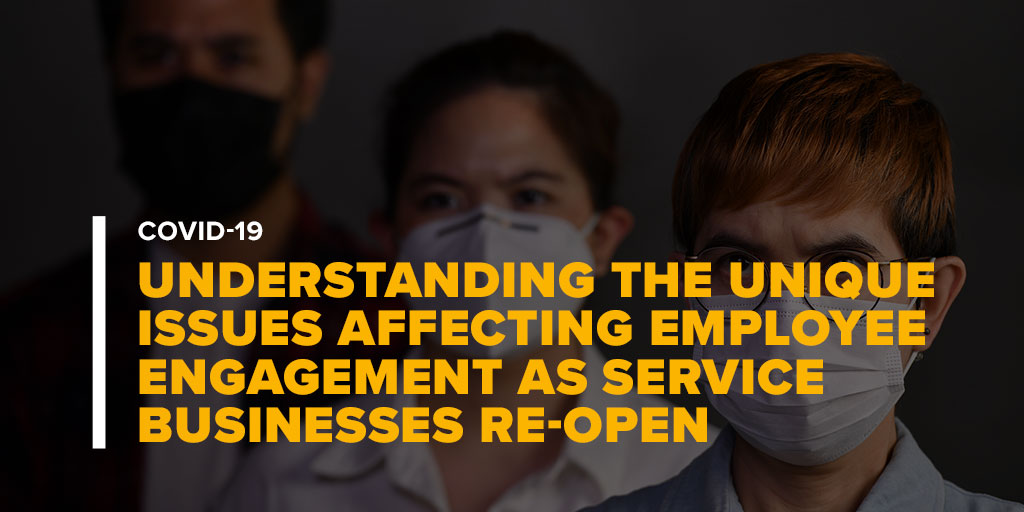Prior to the COVID-19 crisis, employee engagement was a key strategy for hotels, restaurants, and other service businesses, which were focused on reducing turnover in a tight job market that made it very difficult to attract skilled staff. Efforts to understand and improve employee engagement were based primarily on annual employee surveys. As service businesses began to recognize that employee sentiment often changed quickly, they added quarterly “pulse” surveys to check progress on engagement programs and stay informed on things affecting the way team members felt about work.
Programs focused primarily in three areas aligned with common things staff identified as important:
- Culture – creating a compelling work environment in which team members feel excited, empowered, and motivated through policies, programs and communications
- Benefits – expanding the range of advantages available to employees, such as healthcare, paid vacation, flexible scheduling, and other non-cash incentives for employees of the company
- Professional Development – providing training and development that opens career opportunities in the company and industry at large
As the market recovers, these things will likely become important again. Today, however, furloughed or laid off service workers are anxious to get back to work, but they are dealing with some unique issues that will have a much higher near-term impact - not only on employee engagement, but also on whether or not talented staff decide that working in a service industry is worth the potential impact to their lives.
Personal Health and Safety
Concerns about personal health and safety trigger survival instincts, which are inherently associated with negative, uncomfortable feelings – this is nature’s way of getting us to move from dangerous circumstances to a place that is safe. The first order of business is to ensure that employees experience an environment that reinforces what is being communicated about health and safety measures.
In any workplace, you will have a variety of opinions and perspectives related to what safety measures are necessary. Managers will have to be diligent with regards to requiring consistent compliance by all staff, ensuring those who are less concerned about safety do not create an environment that feels unsafe to others.
Childcare/Eldercare
Many staff members in service industries have children. The restaurant industry alone employs 3.5 million parents. Approximately 1 million of them are single mothers – many with children under the age of 13. Some members of your team may also have sheltered in place with parents or other elderly family members to help provide care. With service businesses such as restaurants and hotels opening more quickly than support services like childcare centers and other affordable caregiving, these staff are likely to be experiencing additional family-related stress as they come back to work.
Take time to understand which of your staff have these concerns. Facilitate connections among these team members, to see if they may be able to help each other with caregiving needs. And consider staffing and scheduling models that better address these team members’ needs, such as 10- or 12-hour shifts that enable these team members to get the hours they need in a week yet be home more days.
Expanded Roles and Workloads
Many service businesses are reopening with skeleton staff who are taking on multiple roles. Cross-utilization is a necessity for service businesses trying to recover from the effects of the market shutdown due to COVID-19 - and a good strategy generally for optimizing labor. Most staff will understand this, but there will be stress associated with the change from a role orientation to one that considers what tasks need to be accomplished to meet customer needs in this financial reality.

This can be exacerbated by the fact that forecasting is almost impossible now. Consumers’ attitudes about travel or even going to dinner are difficult to project and often affected by daily news. Until the market begins to show clear patterns that can be surfaced by forecasting and scheduling systems, your staff are likely to be called upon to carry a heavier load more often as volumes fluctuate. Things as simple as expressing appreciation and reassuring staff that you are aware and taking steps to improve forecasting and scheduling are small ways to engage team members.
Ability to Communicate
While those who work in an office typically have access to a broad range of options for communication - email, Slack, Zoom, etc. - service employees historically have not had access to work email addresses or other formal corporate channels. This makes it more difficult to get updates on issues such as changes to policies, request schedule changes or swaps with other team members, or even just communicate directly with a manager without making a phone call or going into work.
Mobile solutions for scheduling and communication can be easily implemented and provide an alternative to more traditional corporate communication channels that aligns well with the lifestyles of service employees.
Evolving Employee Attitudes
As discussed in my recent article, Keeping the Pulse of Your Staff as You Navigate to a ‘New Normal’, the circumstances of COVID-19 and the market economy continues to evolve. With that evolution, employee attitudes will also shift. This fluid environment requires diligence to stay abreast of attitudes that can change in 24 hours depending upon daily news reporting and trending stories in social media. Checking in often, through person-to-person channels and frequent pulse surveys that allow team members to respond anonymously is your best approach to getting the full view you need to address issues that affect staff attitudes and engagement.






